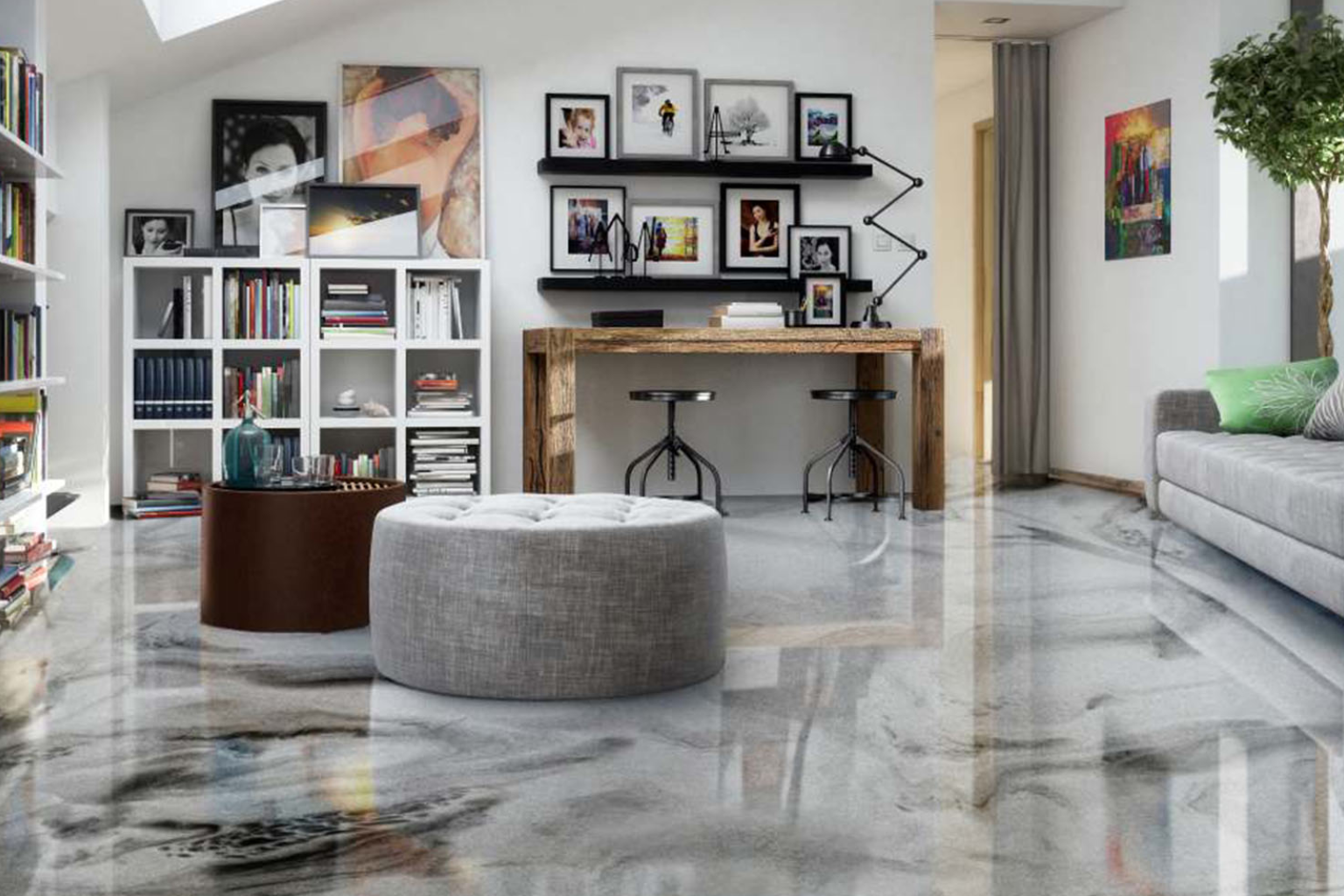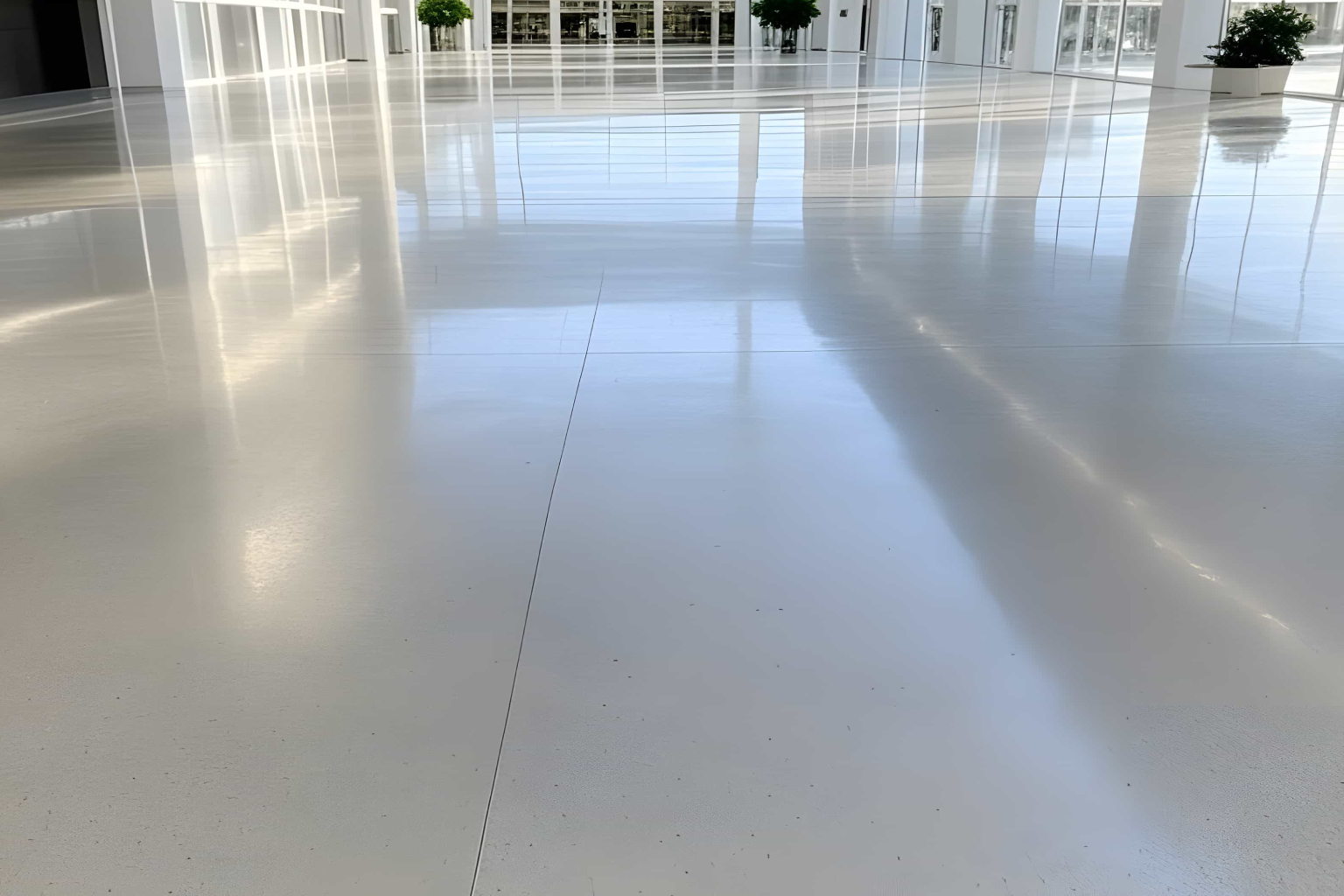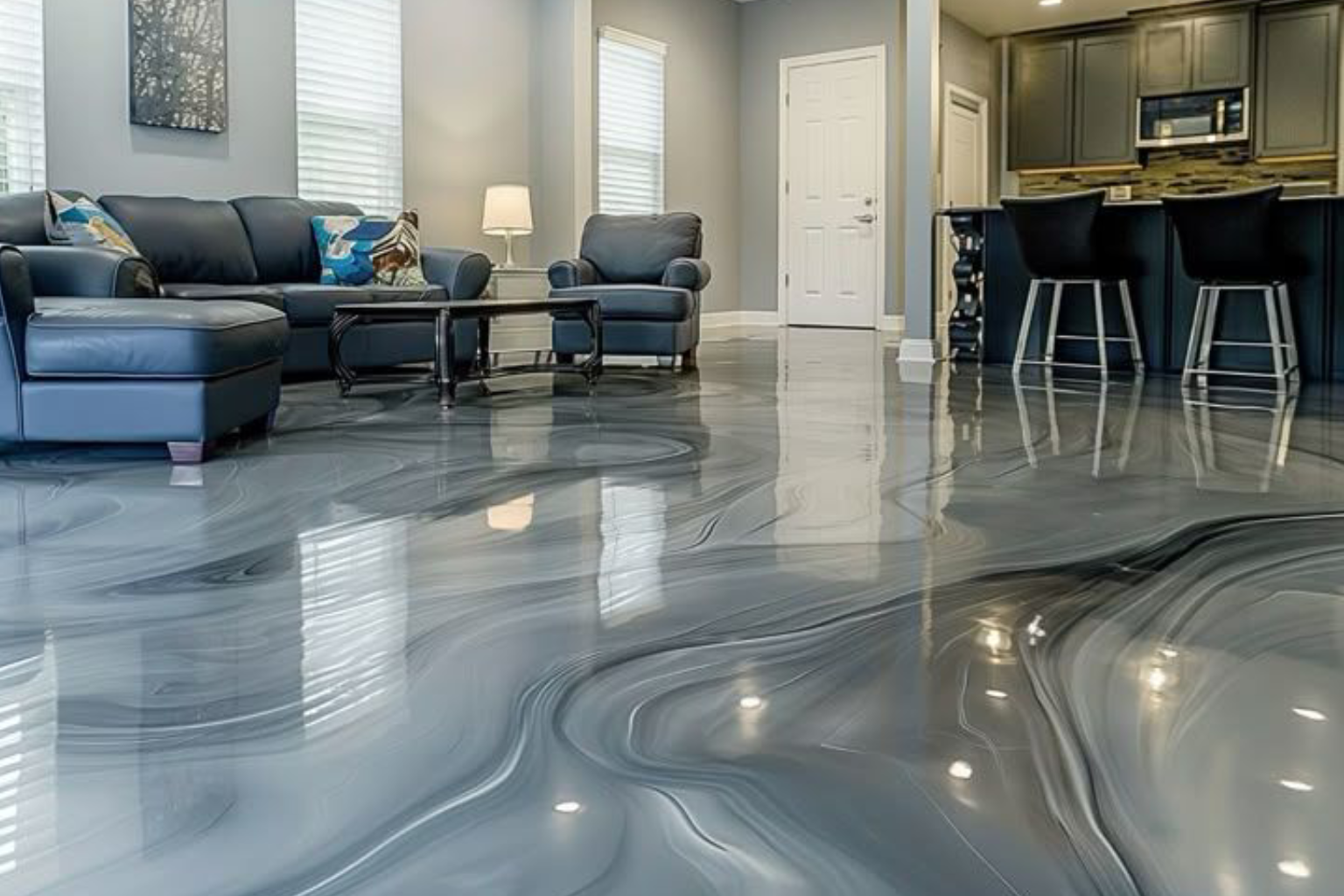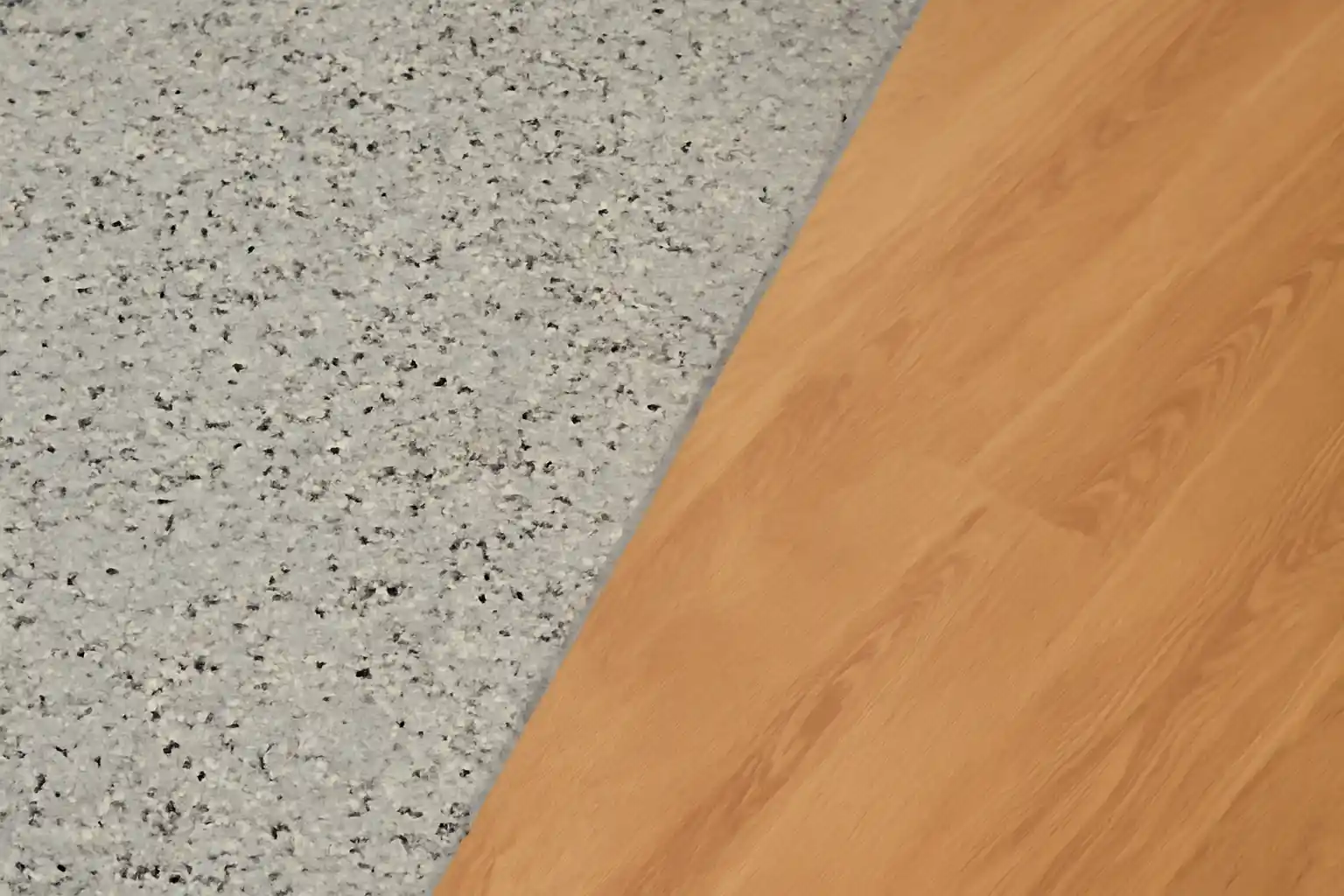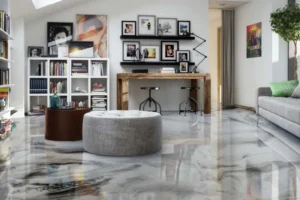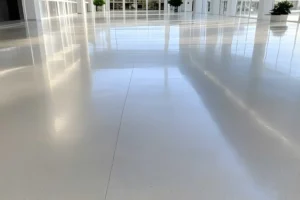You have many choices in flooring when deciding on flooring for a home or workspace. Two of the many flooring options you may choose from are epoxy flooring and traditional flooring, such as wood, tile, or carpet. Traditional flooring has its advantages and uses, as does epoxy flooring.
Choosing the right flooring for your project can greatly affect the way your area looks and feels, as well as what type of flooring will last longer and best meet your needs. This guide will compare epoxy flooring with traditional flooring, so you can make a more informed decision about what type of flooring is best for your needs.
What Is Epoxy Flooring: Understanding the Basics
Before we get to the actual comparison, let’s understand what epoxy flooring is. Epoxy is a hard, shiny surface created by mixing two constituents, resin and hardener. When combined, both materials create a thick, sticky epoxy floor coating that adheres to concrete floors, leaving them with a solid, smooth surface.
Epoxy floors are especially suited for high-traffic areas. You can find epoxy flooring in garages, kitchens, basements, warehouses, and shops. Epoxy flooring is durable, easy to care for, and handles daily traffic and heavy use with no trouble.
What is Traditional Flooring?
Traditional flooring is pretty simple. It’s the typical flooring that’s most commonly used for residential applications. Traditional flooring types include:
- Hardwood, tile, vinyl, laminate, and carpet. Traditional flooring comes in many styles, colors, and textures.
- Hardwood flooring is made from real wood and brings a warm, natural look to any space.
- Tile flooring is durable and works well in wet areas, i.e., bathroom, kitchen..
- Vinyl flooring is resilient, pliable, and easy to clean.
- Laminate flooring looks like wood but is built from synthetic layers.
- Carpet offers a gentle surface underfoot, making it a great choice for quiet and restful areas of the home.
Durability Comparison of Traditional vs Epoxy Flooring
Epoxy flooring is known for being one of the most durable and long-lasting flooring choices available. It will handle lots of use without becoming damaged. Epoxy is resistant to moisture, chemicals, and wear. Therefore, you can use epoxy for kitchens, garages, offices, and other working spaces.
Unlike traditional flooring, and depending on the materials used, epoxy will not crack or stain and can last exceptionally well with minimal maintenance.
There are different durability levels for traditional flooring, depending on the materials used:
- Hardwood can easily scratch and may require refinishing.
- Carpet can fade, flatten, or get dirty easily in areas with lots of foot traffic.
- Tile is strong but may crack and break when something heavy falls onto it.
- Vinyl and laminate are average resistant to damage, but may eventually dent or peel.
So, while some traditional flooring options may prove durable, epoxy flooring is generally more damage-resistant. Epoxy flooring is a better option if you require something durable or lasting.
Cleaning and Maintenance Comparison
One of the most sought-after benefits of epoxy flooring is its easy, effortless cleaning. The smooth surface simply does not hold onto dust or dirt. It can be swept or mopped with ease. Spills, oils, or chemicals can be wiped clean without leaving stains behind. Epoxy floor cleaning does not require any specialized cleaners, which saves time and money.
Traditional flooring needs different levels of care based on the material, like:
- Hardwood will need to be cleaned carefully, and most require polishing.
- Carpet holds dust and stains easily, requiring regular vacuuming and deep cleaning.
- Tile may clean well, but the grout lines will still need scrubbing.
- Laminate and Vinyl are easy to clean but will scratch easily if cleaned improperly.
As a whole, all epoxy flooring types are low-maintenance and well-suited for high-traffic areas. Traditional flooring types may require more frequent cleaning, as well as keeping cleaning products that may require special handling to keep them clean.
Installation Process of Epoxy Flooring vs Traditional Flooring
The installation process of your floor can vary greatly in terms of time, cost, and effort. Here’s how epoxy flooring compares to traditional flooring.
Epoxy Flooring Installation
Most installations of epoxy flooring will need to be done by a professional. Here are the steps to install epoxy flooring:
- Clean and prep the concrete surface
- Put down layers of epoxy floor coatings
- Wait for time to cure or harden (up to a couple of days)
- Installation should start with a clean, dry surface, or the epoxy will not stick properly. You also need time for the floor to dry completely before walking on it and placing furniture.
Traditional Flooring Installation
The installation of traditional flooring will vary based on the type of flooring you choose:
- Vinyl and laminate may have DIY Click-lock options that require very basic skills
- Carpet and tile may have a slightly more complicated installation process, but they can be installed in a day
- Hardwood floors tend to take more time and possibly some sanding and sealing work
- Many traditional flooring types can be installed in a short period or possibly even a few hours.
If you are looking for flooring that will be completed in a short amount of time, some traditional floors would be easier than epoxy. If you are looking for something smooth and durable, but requires professional information, epoxy will take more time and effort for installation.
Comparison of Ideal Use Cases
You will find the best use of epoxy flooring in garages, basements, and workspaces owing to its incredible durability and nearly indestructible nature. Commercial spaces, such as stores and warehouses, are also well-suited for epoxy flooring.
When it comes to traditional flooring, carpet and wood are great choices for cozy rooms like bedrooms and living areas. Tile flooring is ideal for spaces with moisture, such as kitchens and bathrooms.
Conclusion
Selecting a new floor, between Epoxy flooring vs traditional flooring, is a personal choice influenced by preferences, style, and budget. Epoxy floors offer a smooth, durable surface that handles heavy use and requires little upkeep. Epoxy gives a modern, visually pleasing touch and is extremely durable. On the other hand, traditional flooring has many options, and its uses are limited to comfortable, classic spaces and low-traffic areas. Some types are easier to install and feel more comfortable underfoot.
Think about how you plan to use the space and the look you want to create. There are clear benefits to epoxy flooring for commercial applications. So, if you’re looking for a durable and long-lasting flooring option for garages and commercial areas, go for industrial epoxy flooring.
FAQs
Is epoxy flooring more durable than traditional floors?
Yes, epoxy flooring is more durable than most traditional floors because it resists scratches, stains, impacts, and heavy foot traffic without wearing out quickly. Its strong surface can handle more pressure than carpet, wood, or vinyl, making it ideal for busy or high-use areas.
How long does epoxy flooring last compared to tile or wood?
Epoxy flooring can last 10 to 20 years with proper care, often outlasting wood that may warp or scratch, and tile that can crack or chip over time. While tile and wood have good lifespans, epoxy maintains its glossy look and strength longer under tough conditions.
Is epoxy flooring suitable for homes or just garages and warehouses?
Epoxy flooring is not just for garages or warehouses. It’s now used in modern kitchens, basements, and even living rooms for a sleek, clean look. Its smooth, seamless surface and wide range of colors make it a stylish and practical option for residential spaces, too.
Which flooring option is easier to maintain, epoxy or traditional?
Epoxy flooring is easier to maintain because it resists dirt, spills, and damage, requiring only a quick mop or sweep to stay clean. Traditional floors like carpet, tile, or hardwood need special cleaning, polishing, or deep care to keep them looking nice.
Does epoxy flooring cost more than traditional flooring?
The upfront cost of epoxy flooring may be slightly higher than some traditional options, but it saves money over time with low maintenance and fewer repairs. Unlike wood or tile, which can need refinishing or replacement, epoxy stays strong and clean for years.
Is epoxy flooring durable?
Yes, epoxy flooring is extremely durable and designed to hold up under heavy weights, chemical spills, and daily wear without cracking or fading. It forms a hard, protective coating over the concrete that makes it tougher than many other types of flooring.
How long does it take to install epoxy compared to traditional floors?
Epoxy flooring installation usually takes 2 to 3 days, including surface prep and curing, while traditional floors like tile or wood may take 3 to 5 days or more. Though both need proper prep, epoxy offers a faster turnaround, especially for large spaces.



